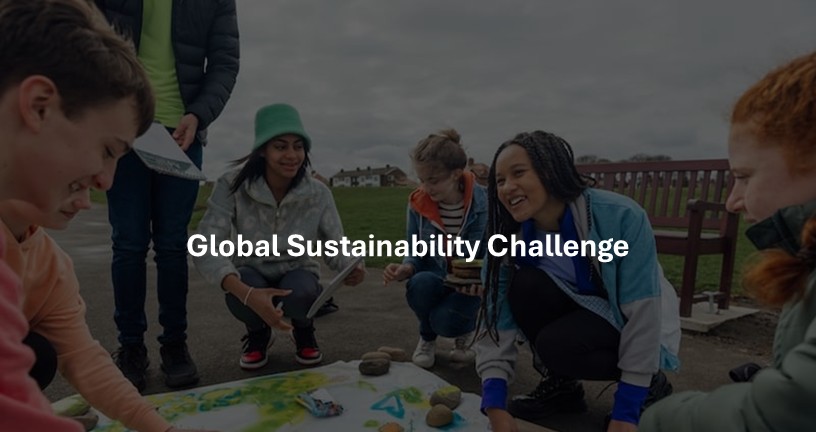Join the Global Sustainability Challenge 2025–26 and turn your ideas into real solutions for a sustainable future. Open to students worldwide—innovate, build, and shine on a global stage
The Global Sustainability Challenge is an annual global challenge where students design, implement, and showcase real-world sustainability solutions supported by Stanford’s Doerr School of Sustainability in partnership with leading universities, the challenge provides structure, mentorship, and visibility to accelerate promising ideas. The Challenge unites student teams worldwide to design innovative solutions for real-world sustainability issues. Guided by expert mentors and educators, participants refine their ideas into impactful projects. Beyond the competition, it builds a lifelong global community of changemakers committed to driving environmental and social progress.
The 2025–26 Global Sustainability Challenge focuses on two key themes — Sustainable Energy and Adaptation & Resilience. Under Sustainable Energy, participants develop solutions that reduce emissions and improve energy affordability, accessibility, and reliability through innovations in generation, transmission, distribution, or storage. The Adaptation & Resilience theme encourages projects that help communities, infrastructure, and ecosystems adapt to climate change, focusing on areas like disaster preparedness, water security, climate-smart agriculture, and resilient infrastructure.
The Global Sustainability Challenge progresses through three exciting phases — Ignite, Build, and Shine — guiding students from ideas to real-world impact.
Themes & Focus Areas
For 2025–26, the challenge has two major themes:
- Sustainable Energy
- Adaptation & Resilience (e.g. disaster preparedness, climate-smart agriculture, infrastructure resilience)
Teams choose one theme as the area for their project.
Phases & Timeline
The competition is broken into three phases:
- Ignite (Late August – Early November 2025)
- Teams are formed, choose a problem, do research, and submit an initial concept and mockup.
- Deadline: November 3, 11:59 PM UTC
- Build (Late November 2025 – Jan / Early Feb 2026)
- Develop, test, and refine prototypes. Present progress in regional showcases.
- Shine (Feb – April 2026)
- Final enhancements, pitch to a global jury, and layout plans for scaling.
The GSC is driven by a belief in student potential: by combining local insight with global collaboration, it transforms campus innovations into scalable, impactful solutions. Beyond the competition, participants join a sustained community, gain visibility, and access resources and networks that extend past the formal phases of the challenge.
Founding Partners & Organizers
Some of the partners include:
- Stanford Doerr School of Sustainability
- Hong Kong University of Science and Technology
- Indian Institute of Technology Bombay
- Imperial College London
- Zhejiang University
- Technical University of Munich
- Young Global Impact, MakerGhat, Maker Bhavan Foundation
Location:
United StatesBenefits
- Gain personalized mentorship from world-class sustainability experts, industry professionals, and academic leaders who support your project journey.
- Build practical skills through hands-on workshops, design thinking sessions, and global showcases that enhance creativity, problem-solving, and presentation abilities.
- Connect with changemakers, funders, and organizations worldwide, expanding your professional network in the sustainability field.
- Earn digital badges, certificates, and trophies at every phase, with opportunities for special awards such as Best Implementation, Highest Impact, or Most Creative Solution.
- Present your ideas to global juries, media, and sustainability platforms, gaining international recognition and potential pathways for project funding or incubation.
- Join a global network of students, mentors, and leaders committed to advancing environmental and social sustainability beyond the challenge.
Eligibilities
- Interdisciplinary teams of 1–6 university students from anywhere in the world are eligible to participate.
- At least one team member must be 18 years or older by January 1, 2026.
- Open to students from all disciplines — Engineering, Design, Arts, Sciences, Policy, and beyond — with diverse perspectives strongly encouraged.
Application Process
If you are interested in joining:
- Form a Team
Gather 2–5 students (or as specified by the rules). Identify your roles, interests, and strengths (e.g. technical, design, policy). - Choose a Theme & Define a Problem
Pick either Sustainable Energy or Adaptation & Resilience. Conduct local research to find a real and meaningful problem in your community that fits the theme. - Design Concept & Mockup (Ignite Phase)
Draft your proposed solution: how it works, target beneficiaries, potential impacts, and a prototype or mockup. - Build & Test (Build Phase)
Create the prototype, test it with users or stakeholders, get feedback, iterate. - Final Pitch / Presentation (Shine Phase)
Prepare a polished demo, presentation, scalability plan, etc., for the global jury. - Use the Resources Provided
The GSC website includes a resource library: templates, case studies, guides, etc. - Register & Stay Updated
- They have a registration / login portal given on the Apply Now link
- You can also subscribe to their newsletter for updates.
Application Deadline: November 3, 2025
Application ClosedOfficial link









